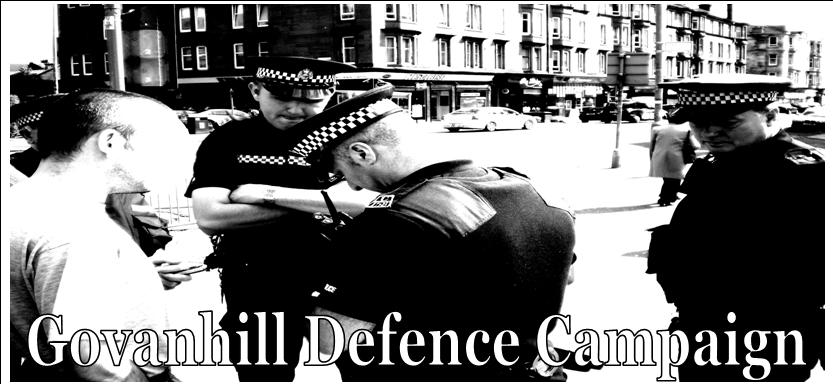On Monday 23 August, three supporters of the Govanhill Defence Campaign met with Chief Inspector Stephen McAllister, Area Commander at the New Gorbals Police Office, following his requests for a meeting.
GDC supporters did not attend the meeting with a view to convincing the police of the campaign's aims or political arguments. It was the Chief Inspector himself who felt the need to defend the actions of his officers.
In the CI's view, what has been happening in Govanhill was a "minor incident" which had "grown arms and legs". He was especially concerned that we should view the events in the southside as harassment and political policing, strenuously stating that Strathclyde police was an "apolitical organisation", that to view the seizing of newspapers and charging of activists as political was a "nonsense" and that it was a "huge leap of the imagination to think that Strathclyde Police are against work in opposition to racism and fascism."
The Chief Inspector is entitled to his views. But to anyone involved in progressive political organisation, the reality is clear beneath the slick public-relations exercise of community policing. To those local residents who faced hundreds of police officers, mounted charges and helicopter surveillance as police forcefully ended the occupation of Govanhill baths in 2001, the idea of a political police is no "nonsense". To those asylum-seekers in Glasgow dawn-raided and their supporters criminalised, it is no leap of the imagination to think the police are hostile to anti-racist action. Across the land, from the brutal attacks on Gaza protesters to the death of Ian Tomlinson at the hands of a masked police officer during the G20 in London, the police are exposing their role in the front-line of suppressing dissent.
The CI thought it "ironic" that the GDC was claiming that human rights were being violated while apparently violating the human rights of his officers by placing their names and photographs on the internet. He requested that in the spirit of co-operation, these were removed.
There is indeed much that is "ironic" about all this. The names and photographs of Strathclyde police officers are available online on the police's own websites. GDC activists filmed on a stalls on Victoria Road from a mobile van are yet to receive copies of the footage. Names and addresses of activists were demanded by police under threat of arrest. Anyone attending political demonstrations is filmed by police, regardless of the peaceful, legal nature of an event. We will not let the police hide behind the shield of anonymity and will continue to expose the officers involved.
The GDC will continue taking the fight for democratic rights to the streets. The recent decision by Glasgow city council to impose severe limitations on marches and parades through the city centre (lumping together supremacist Orange parades with trade union marches) shows this is a fight that will increasingly come to affect all of us. If opposition to attacks on the public sector and the living standards of the working-class as a whole is to be built, these attacks on democratic rights must be challenged.

